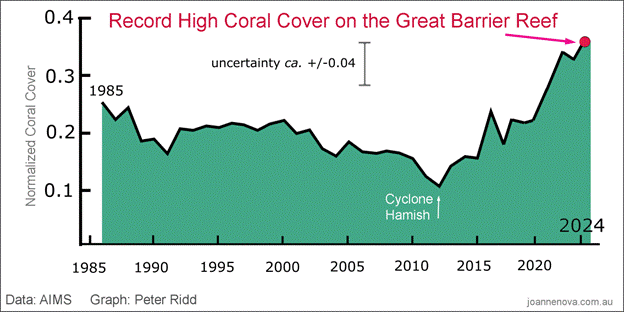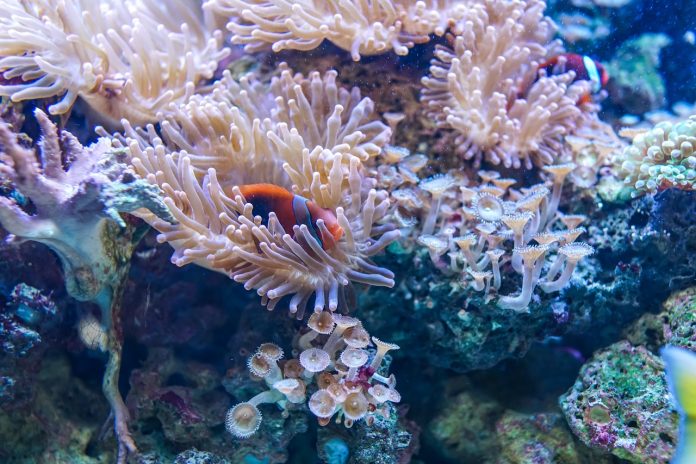An article posted by the BBC, “400-year record heat threat to Great Barrier Reef,” written by the BBC’s science correspondent Victoria Gill and senior science producer Kate Stephens, claims that recent research indicates the Great Barrier Reef (GBR) is in terrible danger of being destroyed by warming waters. This finding is unsupported by available data, the current state of the GBR, or an examination of its history. The reef is doing well at present, with record extent. There is little reason to believe current or reasonably expected temperatures are or will be catastrophic to the GBR.
“Researchers in Australia say temperatures in and around the vast coral reef over the past decade are the highest recorded in 400 years,” the BBC claims, and the past nine years have seen five mass bleaching events due to “extreme heat.” The BBC goes on to say that some researchers who published an alarming report in Nature, say that the reef is under an existential threat from climate change.
It’s worth pointing out that the claim of the “highest recorded in 400 years” is not firm. The research paper itself uses a probability, a high one, but still acknowledges uncertainty concerning whether the recent alleged heat extremes were actually higher than other heat extremes in the 1600s and 1800s. This is all based on proxy data, which is useful but not certain, and shouldn’t be confused with temperature measurements from modern instruments. Regardless, we know that in fact the sea around the Great Barrier Reef has certainly been hotter historically than it is now and that corals have persisted for literally millions of years.
Towards the very end of the BBC article, one of the scientists, Helen McGregor from the University of Wollongong, admits that “Reefs have survived a lot of change over geological time. So I guess the question comes down to – what kind of reef do we end up with?” She acknowledges that reefs are not naturally fixed and unchanging, even as she persists in encouraging reef-related climate alarmism.
Coral has existed through periods of significantly higher and lower temperatures and carbon dioxide levels than today.
Beyond that, the reef itself is in the best shape it has been in since recordkeeping began in the 1980s, almost 40 years of warming ago. 2024 is the third year in a row where the Great Barrier Reef has set records for coral cover, as described in this Climate Realism post, here. (See figure below)

Bleaching is not coral death, as discussed in Climate at a Glance: Great Barrier Reef, as the scientists who worked on this report and the BBC’s reporters well know, even if the general public may not. Although, after much fearmongering, the BBC admits this fact towards the end of its article, the writers likely know that it won’t matter that the last paragraphs of their piece moderate the tone of the story from the alarming impression given by opening paragraphs and headline.
Previous bleaching events in the Great Barrier Reef that resulted in 22 percent of the reef being affected saw more than 75 percent of the affected areas rebound shortly afterwards. All three regions of the reef are rebounding from the previous severe bleaching events.
The scientists involved are trying to use the report to get the UN Educational, Scientific, and Cultural Organization, which previously declared the reef a World Heritage Site, to change the GBR’s status to “endangered” which would bring a higher level of government attention, and therefore funding, for the reef and scientists trying to “protect” it.
The BBC and these scientists appear to be cynically promoting climate alarm while ignoring or downplaying real world conditions of the GBR. This is not science or legitimate journalism, but rather it is propaganda aimed at stoking fear in order to secure more research funding and government action. The only real contribution the study makes to science is as an experiment in modelling using proxies. The BBC’s coverage of the story has no journalistic value at all.

















